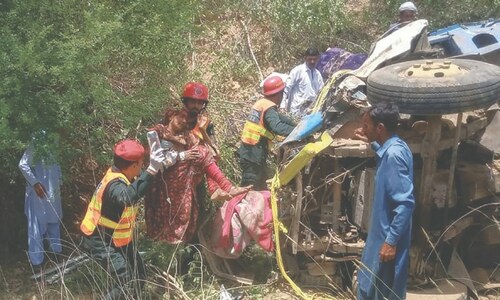WASHINGTON, July 13: The United States did not go to war against Iraq because it believed former Iraqi president Saddam Hussein had nuclear weapons or was buying uranium from Africa, the White House said on Sunday.
“We have never said that we thought that he had nuclear weapons,” US National Security Adviser Condoleezza Rice told the Fox News on Sunday.
“It is ludicrous to suggest that the president of the United States went to war on the question of whether Saddam Hussein sought uranium from Africa,” she added.
Her statement comes amid a growing controversy over President Bush’s State of the Union address in January in which he claimed that Iraq had tried to buy uranium from Niger.
Since then, the information has proven wrong and on Friday CIA Director George Tenet admitted that he was responsible for allowing the president to use a false intelligence report in his speech.
Mr Tenet’s admission, however, has not satisfied the opposition leaders, and on Sunday a Democratic presidential candidate, Howard Dean, urged the administration to assure the nation that the president “did no deliberately lie to the American people.”
Reports in the US media on Sunday pointed out that in his State of the Union address, President Bush also spoke of Iraq’s efforts to buy aluminium tubes for making nuclear weapons. This also proved incorrect.
The question several Democrats are asking now is: whether it was right to go to war against Iraq on the basis of those reports?
Ms Rice, however, said that in his speech President Bush had laid out “a very broad case” against Iraq and there was only a reference to Baghdad’s attempt to buy uranium.
She said the collective judgment of the intelligence agencies was that he (Saddam Hussein) had acquired those nuclear tubes for purposes of centrifuge construction.
Asked would it be safe to say that Saddam Hussein did not have nuclear weapons, Ms Rice said: “we have never said that we thought that he had nuclear weapons. This was an issue of reconstitution, of how quickly he might be able to reconstitute a vast infrastructure that was still in place, of the fact that we missed, the last time around, how close he was to a nuclear weapon.
“But the reconstitution case was based on a number of issues: the procurement, the brainpower of the scientists, the efforts to get high-quality components for centrifuges. We have found, for instance, with the scientists that we found, that he was burying pieces of centrifuges in his yard,” she added.















































Dear visitor, the comments section is undergoing an overhaul and will return soon.